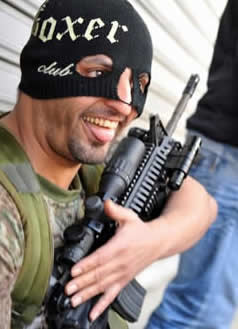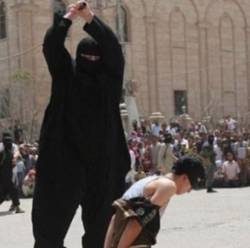| Day 1 can be seen here and here. |
Nonstop gunfire in central #Baghdad tonight. Numerous casualties throughout the city. pic.twitter.com/twkPVFK6co
— The Intel Crab (@IntelCrab) August 29, 2022
[ENGLISH.ALARABIYA.NET] Iraqi Shia holy man Moqtada
Tateral-Sadr
 ...hereditary Iraqi holy man and leader of a political movement in Iraq. He had his hereditary rival al-Khoei assassinated shortly after the holy rival's appearance out of exile in 2003. Formerly an Iranian catspaw, lately he's gagged over some of their more outlandish antics, then went back to catspawry...
...hereditary Iraqi holy man and leader of a political movement in Iraq. He had his hereditary rival al-Khoei assassinated shortly after the holy rival's appearance out of exile in 2003. Formerly an Iranian catspaw, lately he's gagged over some of their more outlandish antics, then went back to catspawry...announced Monday that he would resign from Iraqi politics, prompting hundreds of his angry followers to storm the government palace and sparking festivities with security forces and between rival militias. At least 15 protesters were killed.
Protesters loyal to al-Sadr pulled down the cement barriers outside the government palace with ropes and breached the palace gates. Many rushed into the lavish salons and marbled halls of the palace, a key meeting place for Iraqi heads of state and foreign dignitaries.
Iraq’s military announced a nationwide curfew, and the caretaker premier suspended Cabinet sessions in response to the violence. Medical officials said dozens of protesters were maimed by gunfire and tear gas and physical altercations with riot police.
As night fell, a militia loyal to al-Sadr clashed with the Popular Mobilization Forces security inside the heavily fortified Green Zone, the seat of Iraq’s government, wounding at least one woman, according to two security officials. Several mortar rounds were heard, the officials said.
The crackle of machine gun fire persisted and echoed throughout central Baghdad.
The PMF is an umbrella group composed of state-sanctioned paramilitary groups, the most powerful of which are aligned with al-Sadr’s rivals in the Iran-backed political camp.
Security officials said mortars and rocket-propelled grenades were used in the festivities, a culmination of intractable political impasse between the rival camps.
Iraq’s government has been deadlocked since al-Sadr’s party won the largest share of seats in October parliamentary elections but not enough to secure a majority government. His refusal to negotiate with his Iran-backed Shia rivals and subsequent exit from the talks has catapulted the country into political uncertainty and volatility amid intensifying intra-Shia wrangling.
Iraq’s majority Moslem population is split into two sects, Shias and Sunnis. Under Saddam Hussein, the Shias were oppressed until the US-led invasion reversed the political order. Now the Shias are fighting among themselves, with the dispute centering around power and state resources but also influence over the Shia street.
To further his political interests, al-Sadr has wrapped his rhetoric with a nationalist and reform agenda that resonates powerfully among his broad grassroots base of supporters who hail from Iraq’s poorest sectors of society and have historically been shut out from the political system.
Many were first followers of his father, a revered figure in Shia Islam. They are calling for the dissolution of parliament and early elections without the participation of Iran-backed Shia groups, which they see as responsible for the status quo.
During Monday’s festivities, Saraya Salam, a militia aligned with al-Sadr gathered in the capital’s Tahrir Square to "protect" protesters, one of its commanders said.
An News Agency that Dare Not be Named photographer heard gunshots being fired in the capital and saw several protesters bleeding and being carried away. It was not immediately clear who fired the gunshots.
A senior medical official confirmed at least 10 protesters were killed by gunfire. The number was also confirmed by the Sadrist media office, which provided a list of 10 names.
Iraq’s caretaker premier said he would open an investigation into the shootings and said the use of live ammunition against protesters was forbidden.
Protests also broke out in the Shia-majority southern provinces, with al-Sadr’s supporters burning tires and blocking roads in the oil-rich province of Basra and hundreds demonstrating outside the governorate building in Missan.
Iran
...a theocratic Shiite state divided among the Medes, the Persians, and the (Arab) Elamites. Formerly a fairly civilized nation ruled by a Shah, it became a victim of Islamic revolution in 1979. The nation is today noted for
spontaneouslytaking over other countries' embassies, maintaining whorehouses run by clergymen, involvement in international drug trafficking, and financing sock puppet
militiasto extend the regime's influence. The word
Iranis a cognate form of
Aryan.The abbreviation
IRGCis the same idea as
Stürmabteilung (or SA).The term
Supreme Guideis a the modern version form of either
Duceor
Führeror maybe both. They hate
considers intra-Shia disharmony as a threat against its influence in Iraq and has repeatedly attempted to broker dialogue with al-Sadr.
In July, al-Sadr’s supporters broke into the parliament to deter his rivals in the Coordination Framework, an alliance of mostly Iran-aligned Shia parties, from forming a government. Hundreds have been staging a sit-in outside the building for over four weeks. His bloc has also resigned from parliament. The Framework is led by al-Sadr’s chief nemesis, former Prime Minister Nouri al-Maliki.
This is not the first time al-Sadr, who has called for early elections and the dissolution of parliament, has announced his retirement from politics — and many dismissed Monday’s move as another bluff to gain greater leverage against his rivals amid a worsening stalemate. The holy man has used the tactic on previous occasions when political developments did not go his way.
But many are concerned that it’s a risky gambit and are worried how it will impact Iraq’s fragile political climate. By stepping out of the political process, al-Sadr is giving his followers, most disenfranchised from the political system, the green light to act as they see fit.
Al-Sadr also commands a militia and maintains a great degree of influence within Iraq’s state institutions through the appointments of key civil servant positions. His Iran-backed rivals also have militia groups.
Iraq’s military swiftly announced a nationwide curfew beginning at 7 p.m. It called on the holy man’s supporters to withdraw immediately from the heavily fortified government zone and to practice self-restraint "to prevent festivities or the spilling of Iraqi blood," according to a statement.
"The security forces affirm their responsibility to protect government institutions, international missions, public and private properties," the statement said.
Iraq’s caretaker Prime Minister Mustafa al-Kadhimi also demanded that al-Sadr call on his followers to withdraw from government institutions.
The UN mission in Iraq said Monday’s protests were an "extremely dangerous escalation," and called on demonstrators to vacate all government buildings to allow the caretaker government to continue running the state.
It urged all to remain peaceful and "refrain from acts that could lead to an unstoppable chain of events."
"The very survival of the state is at stake," the statement said.
Al-Sadr announced his withdrawal from politics in a tweet, and ordered the closure of his party offices. Religious and cultural institutions will remain open, it said.
The true motivations behind al-Sadr’s announcement appeared to be a reaction to the retirement of Shia spiritual leader Ayatollah Kadhim al-Haeri, who counts many of al-Sadr’s supporters as followers.
In a surprise announcement Sunday, al-Haeri said he would be stepping down as a religious authority for health reasons and called on his followers to throw their allegiance behind Iran’s Ayatollah Ali Khamenei
...the very aged actual dictator of Iran, successor to Ayatollah Ruhollah Khomeini...
, rather than the Shia spiritual center in Iraq’s holy city of Najaf.
The move was a blow to al-Sadr, who despite harboring ambitions to be a religious authority lacks the scholarly credentials to be an ayatollah. al-Haeri, who resides in the Iranian holy city of Qom, once provided him with the legitimacy he lacked by designating al-Sadr as his representative in Iraq. He cut ties shortly after with the holy man, but continued to enjoy the support of his followers.
By calling on his followers to side with Khamenei, al-Haeri brought on a crisis of legitimacy for al-Sadr.
In his tweet, al-Sadr said al-Haeri’s stepping down "was not out of his own volition."
The Kuwaiti Embassy in #Iraq urged its citizens in Iraq to leave the country, #Kuwait's state news agency (KUNA) reports.https://t.co/2tzuyKmMqx pic.twitter.com/GjLrZxr6mP
— Al Arabiya English (@AlArabiya_Eng) August 29, 2022
DShK=14.5mm antiaircraft machine gun, mounted on a "technical."What appears to be a DShK mounted on a pickup hammering away in Baghdad's Green Zone tonight. pic.twitter.com/2s72Kv9sgm
— Moshe Schwartz (@YWNReporter) August 29, 2022
Iraqi PM declares tomorrow a holiday nationwide: https://t.co/yXi2da57hQ
— The Intel Crab (@IntelCrab) August 29, 2022
#Breaking
— Blesa Shaways (@Bilesa_Shaweys) August 29, 2022
Casualties due to clashes between Saraya Al Salam militants and security forces in #Baghdad’s GreenZone pic.twitter.com/QOyNHBUNzx
“ go back to Iran you pawns” Sadrists clashing with an unknown force. #Iraq pic.twitter.com/HWZk1GuSnH
— Steven Nabil (@thestevennabil) August 29, 2022
| HQ's of most of the pro-Iran groups are burning all over Shia Iraq. Basra has had street battles too. |
| Related: U.S. spokesman denies the Green Zone embassy was evacuated. |

 ...The nation is noted for
...The nation is noted for  [SHAFAQ] The President of the Kurdistan region, Nechirvan Barzani, and Prime Minister Masrour Barzani, congratulated
[SHAFAQ] The President of the Kurdistan region, Nechirvan Barzani, and Prime Minister Masrour Barzani, congratulated  Hezbollah
Hezbollah ...a theocratic Shiite state divided among the Medes, the Persians, and the (Arab) Elamites....
...a theocratic Shiite state divided among the Medes, the Persians, and the (Arab) Elamites.... ...formerly ISIS or ISIL, depending on your preference. Before that they were al-Qaeda in Iraq, as shaped by Abu Musab Zarqawi. They're really very devout, committing every atrocity they can find in the Koran and inventing a few more. They fling
...formerly ISIS or ISIL, depending on your preference. Before that they were al-Qaeda in Iraq, as shaped by Abu Musab Zarqawi. They're really very devout, committing every atrocity they can find in the Koran and inventing a few more. They fling  ...a theocratic Shiite state divided among the Medes, the Persians, and the (Arab) Elamites. Formerly a fairly civilized nation ruled by a Shah, it became a victim of Islamic revolution in 1979. The nation is today noted for
...a theocratic Shiite state divided among the Medes, the Persians, and the (Arab) Elamites. Formerly a fairly civilized nation ruled by a Shah, it became a victim of Islamic revolution in 1979. The nation is today noted for